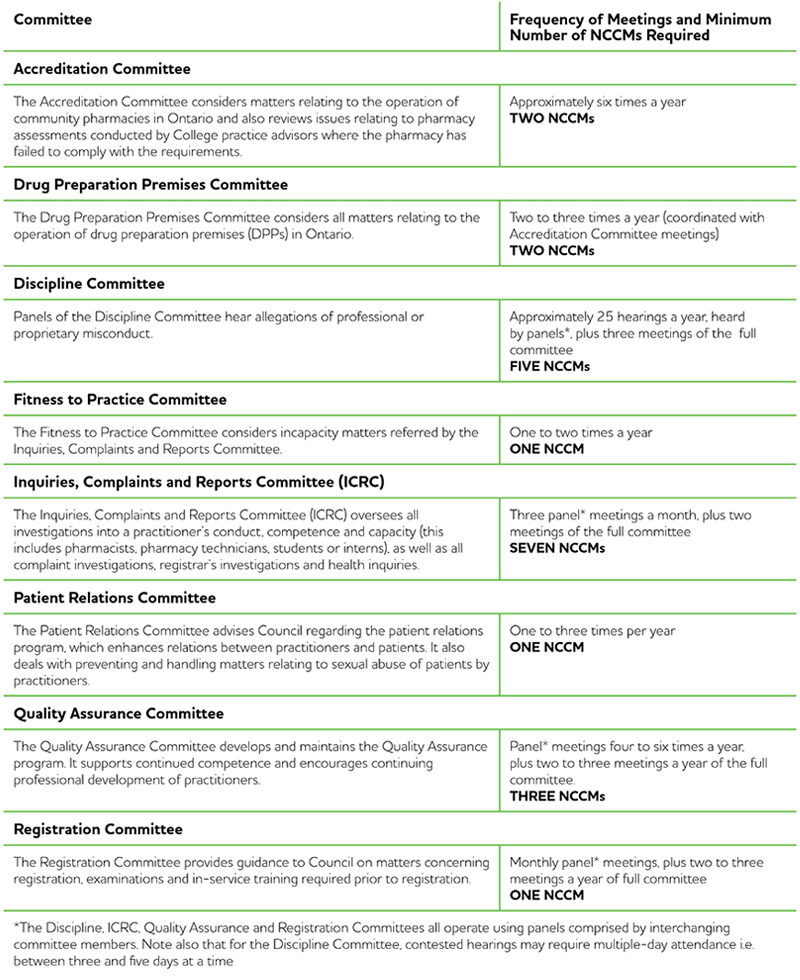You can make an invaluable contribution to helping the College regulate pharmacy in the public interest and advance the quality and safety of pharmacy practice in the province as a non-Council committee member!
The College’s eight statutory committees play an important role in advancing the College’s mandate to serve and protect the public interest. These committees require the appointment of pharmacists and pharmacy technicians who are not elected members of Council and whose competencies, skills and experience align with the College’s needs and obligations. From time to time, these individuals are required to serve on various special committees, working groups or task forces. Their competencies reflect the criteria set out in the “Eligibility and Competency-Based Committee Appointment Framework” developed by the Advisory Group for Regulatory Excellence (AGRE), comprising the six largest health regulatory colleges. The framework is rooted in evidence and best practice in Ontario regulatory governance.
Non-Council committee members (NCCMs) are appointed at the beginning of each Council year (September Council). The Chairs of the Committees are elected on the first day of the Council meeting after which the remaining committee members are appointed.
Each NCCM is responsible for upholding the mandate of the College and acting in accordance with its values and policies. To further understand the role of an NCCM, please review the College Objects (Appendix 4 of the Governance Manual), By-laws, Code of Ethics and Code of Conduct for Council and Committee members.
THE ROLE OF A NON-COUNCIL COMMITTEE MEMBER
As a NCCM, you play an important role in the College’s commitment to advance the interests, health and wellbeing of the public. As such, you also have a fiduciary duty to assert undivided loyalty and good faith in fulfilling the mandate of the College. This duty includes:
- Being Diligent – being prepared for meetings, reviewing materials, arriving on time and participating in discussion.
- Being Civil – respecting the process and fellow committee members, paying attention (e.g., no mobile devices during the meetings), genuine listening and consideration and adopting an objective approach to decision making.
- Being Ethical – using College resources appropriately, being aware of the facts (e.g., reading the materials on a particular matter).
- Being cognizant of and declaring Conflicts of Interest (e.g. financial, adjudicative, and organizational).
- Ensuring Confidentiality is maintained. This applies to all information obtained in the course of OCP duties, unless an exception applies. Discretion is critical especially in the area of complaints as, in some cases, allegations are unsubstantiated. Maintaining confidentiality prevents tainting of processes and facilitates the exploration of all options to avoid misinterpretation.
COMMITTEE OPPORTUNITIES
The table below provides a brief description of the duties of the Committees, the minimum number of NCCM positions required to be filled and the approximate number of days required for meetings.
Staff will solicit the availability of members well in advance of booking meetings, and will confirm meeting times with participants. For most meetings, material will be made available online and prior to the meeting to allow time for review.
If you are interested in being considered for appointment to a committee, complete the application form and send by July 31, 2019 to Sarah MacDougall, Council and Committee Liaison in the Registrar’s office at council@ocpinfo.com. You will be advised after Council’s September meeting if you have been appointed to serve on a committee.














